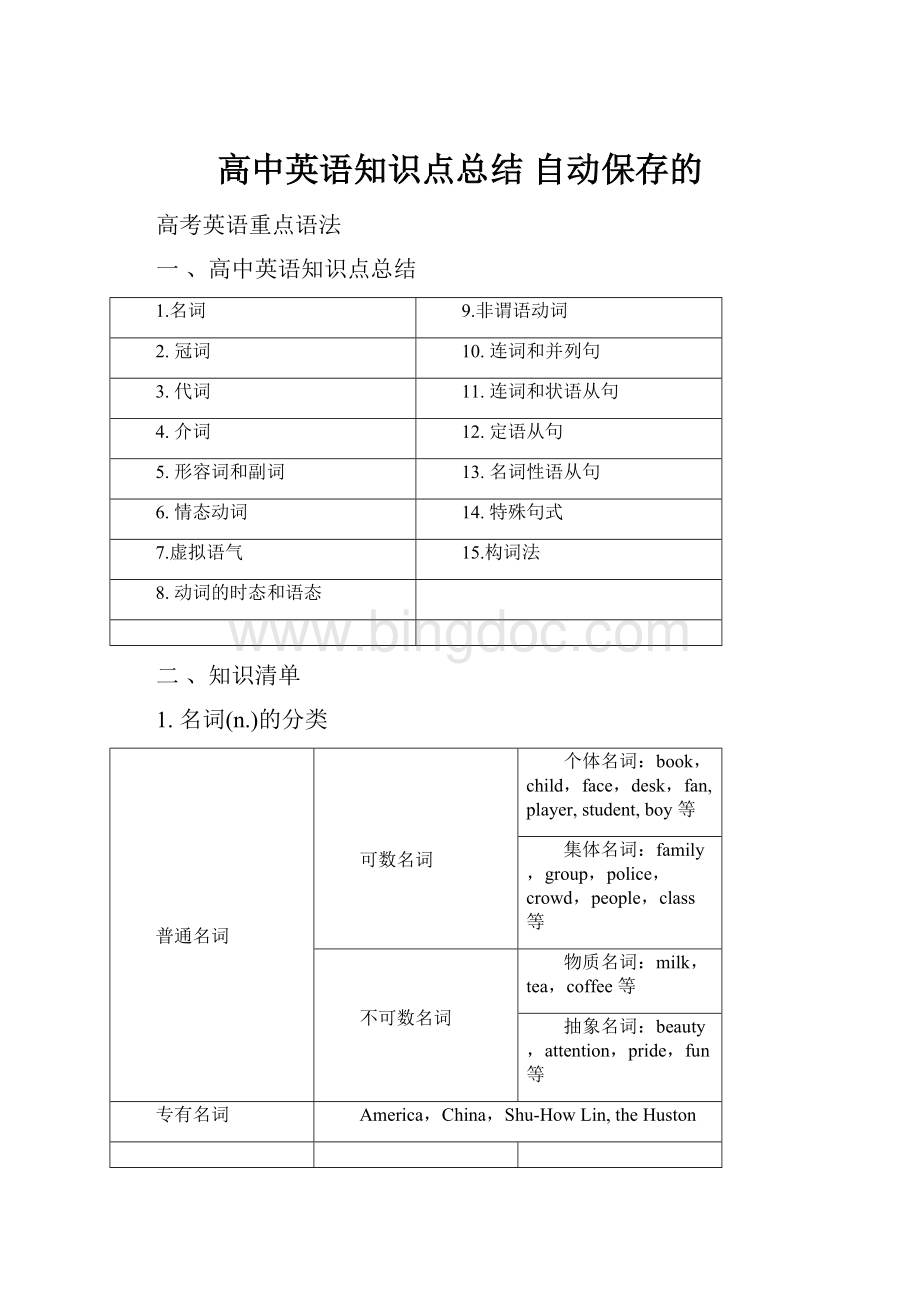高中英语知识点总结 自动保存的.docx
《高中英语知识点总结 自动保存的.docx》由会员分享,可在线阅读,更多相关《高中英语知识点总结 自动保存的.docx(23页珍藏版)》请在冰点文库上搜索。

高中英语知识点总结自动保存的
高考英语重点语法
一、高中英语知识点总结
1.名词
9.非谓语动词
2.冠词
10.连词和并列句
3.代词
11.连词和状语从句
4.介词
12.定语从句
5.形容词和副词
13.名词性语从句
6.情态动词
14.特殊句式
7.虚拟语气
15.构词法
8.动词的时态和语态
二、知识清单
1.名词(n.)的分类
普通名词
可数名词
个体名词:
book,child,face,desk,fan,player,student,boy等
集体名词:
family,group,police,crowd,people,class等
不可数名词
物质名词:
milk,tea,coffee等
抽象名词:
beauty,attention,pride,fun等
专有名词
America,China,Shu-HowLin,theHuston
2.冠词的分类及用法
不定冠词(a/an)的用法
用于n.前表类指:
Agirlwantstoseeyou.
用于单数集体n.前:
Thecityhasapopulationof3billion.
用于物质n.前,表单一概念:
It’saverygoodcheese.
用于抽象n.前:
Heisasuccess./Iamquiteataloss.
用于专有名词前:
AMr.Browncametoseeyouyesterday.
定冠词the的
用法
特指说话双方都明白的人或物:
Thechildrenhavegonetothebeach.
指上文提到过的人或事:
Hehasapen.Thepenisblack.
与单数名词连用表一类人或事物:
InmanyplacesinChina,thebicycleisstillpopular.
the+adj.表示一类人:
theyoung/theold/thepoor/therich
用在序数词和最高级前:
Heisthefirsttoreach.
the+姓氏复数,指一家人或夫妇二人TheGreensareattable.
零冠词
不可数名词、复数名词表泛指,用零冠词:
Horsesareusefulanimals.
Waterischangedintosteambyheatandintoicebycold.
三餐、球类和棋类、学科前,用零冠词:
playfootball
季节、月份、星期、假日等前,用零冠词:
Winterhascome.Isspringfaraway?
ThanksgivingDayfallsonthe4thThursdayinNovember.
3.代词pron.考点清单
人称代词
主格:
Iyouhesheitweyouthey
宾格:
meyouhimheritusyouthem
物主代词
n.性:
myyourhisheritsouryourtheir
adj.性:
mineyourshishersitsoursyourstheirs
反身代词
myselfyourselfhimselfherselfitselfourselvesyourselvesthemselves
指示代词
thisthesethatthose
互相代词
eachother,oneanother
连接代词
详见名词性从句
关系代词
定语从句
疑问代词
what,which,who,whom,whose等
不定代词
both,all,either,neither,some,any,none
other,another,others,theother,theothers
复合不定
代词
something,someone,somebody,anything,anyone,anybody,
nothing,noone,nobody
4.介词按结构分
简单介词
at,in,on,before,after,for,during,by,behind,from,like,until,
under,with,since,as等
合成介词
into,inside,without,outside,through,toward,within
分词介词
given=considering(考虑到),including,following
短语介词
Accordingto,dueto,owingto,thanksto,aheadof,becauseof,
apartfrom,exceptfor,inspiteof,inneedof,forfearof,incharge
of,insearchof,aswellas,asaresultof…
按意义分
表示时间
at,in,on,by,after,since,for,during,within,through,over,until,
表示方位
at,in,on,for,toward,into,outof,alongdown,up,from,off,
above,over,below,under,inside,outside,beside,near,across,
through,around,among
表示原因
becauseof,owingto,dueto,for,asaresultof,at
表示方式
with(工具),in(语言,材料),by(方式)
表示除外
besides,except,exceptfor,but,apartfrom
表示数量
about,round,around,over
表示关于
about,on
表示增减
by,to
短语中的介词
动词+介词
agreewith,thinkabout,worryabout,careabout,aimat,date
from,benefitfrom,sufferfrom,resultfrom,resultin,accountfor,
succeedin,sendfor,callfor,carefor,longfor,lookafter,break
into,burstinto,lookinto,runinto,approveof,dreamof,depend
on,feedon,carryon,insiston,dealwith,dowith,actas
动词+副词+介词
datebackto,catchupwith,dowellin,getonwith,breakaway
from,comeupwith,teamupwith,getdownto,getcloseto,look
forwardto,lookdownupon
动词+名词+介词
takecareof,catchsightof,losesightof,makefunof,makeroom
for,makesentenceswith,makeuseof,takeadvantageof,take
partin,payattentionto,showrespectfor,showinterestin,have
aneffecton,playarolein,playatrickon,taketheplaceof
be+形容词+介词
beinterestin,becrazyabout,beaccustomedto,beaddictedto,
bedevotedto,besimilarto,beusedto,bestrictwithsb./insth.,
becrowdedwith,besatisfiedwith,beequippedwith,befondof,
beawareof,beproudof,betiredof/from,befamousfor/as,
befamiliarwith,befitfor,besuccessfulin
介词+名词
introuble,indanger,insurprise,indetail,insilence,atwar,at
table,atdesk,onbusiness,onfire,onshow,onwatch,onstrike,
onsale,onholiday,onvacation
5.形容词和副词
1)、形容词和副词的基本用法,在句中的位置
形容词
.adj.基本用法:
作定语、表语、补足语、状语
.adj.做后置定语的情况:
adj.短语做后置定语;修饰复合不定代词
.分词adj
-ed形容词,(人)感到……的
-ing形容词:
令人……的(事)
.表示类别或整体:
theold,theyoung,thewounded,therich,thepoor
副词
.adv.基本用法:
作状语,修饰v.adj.另一个adv.或整个句子
.adv.在句中的位置:
enough放在所修饰的adj./adv.的后面
频度副词常放在be动词、情态动词之后,行为动词之前
.搭配特别的adj.和adv:
aheavyrain/rainheavily/asoundsleep……
2).形容词和副词的比较级和最高级
平级比较
.用as…as,not…as/so…as引导。
HegetsupasearlyasI.
.as+形容词+as+数词+名词=数词+名词+形容词。
Thebuildingisastallas100meters.=Thebuildingis100meterstall.
.看似平级比较结构的一些惯用语。
aslongas只要,assoonas一……就,
aswellas既……又……
超越比较
.比较级的修饰语常见的有rather,much,still,even,far,alot,alittle,byfar,abit,
threetimes等。
Thestudentsstudyevenharderthanbefore.
.“the+比较级…,the+比较级…”表示“越……越……”
Theharderyoustudy,themoreknowledgeyouwilllearn.
.“比较级+and+比较级”表示“越来越……”
Thenewcityisbecomingmoreandmorebeautiful.
.“the+比较级+ofthetwo+名词”表示“两个……中较……的”
Thetallerofthetwoboysismybrother.
6.情态动词
情态动词
主要用法
典型例句
can/
could
表示能力
Hecanplaytabletennisquitewell.
表示理论上的可能性,“有时会;可能会”
Evenanexperiencedteachercanmake
mistakes.
表示请求和允许
表示请求,口语中常用could代替can
Youcanhavemyseat.I’mgoingnow.
Couldyougivemeahand?
may/
might
表示请求、允许、许可,might比may语气更委婉
Youmayusemydictionary.
MightIhavealookatyournewphone?
must
表示“必须”
Wemuststudyhardandmakeprogress
everyday.
表示“偏要;硬要”
Ifyoumustsmoke,pleasegoout.
shall
用于第一、三人称的疑问句中,表示征求对方的意见
ShallIopenthedoor?
用于第二、三人称的陈述句中,表示说话人给对方的命令、警告、允诺或威胁;此外,当颁布法律,规定时也用shall
Youshallgetananswerfrommeby
tomorrow.
Heshallgofirst,whetherhewantsornot.
ThislawshallcomeintoeffectonMay1st.
should
should
表示劝告和建议,作“应该”讲
Youshouldlearnfromeachother.
表示惊讶、意外等情绪,意为“竟然”
Ican’tbearthatheshouldspeakillofme.
用在if条件句中,表示可能性很小,但也不是完全不可能
Ifanyoneshouldcome,sayI’mnotathome.
will/
would
表示意志或意愿
Ihavetoldhimagainandagaintostop
smoking,buthewillnotlisten.
表示“请求;建议”。
would比will委婉、客气
Wouldyoulikesomemorecoffee?
表示习惯:
will可以表示现在的习惯,意为“总是;习惯于”。
would表示过去的习惯性动作
Shewillsitforhoursreadingintheroom.
Whenshewasyoung,hewoundlistentomusicaloneinhisroom.
表示事物的某种性质和倾向
Woodwillfloatonthewater.
need
表示“需要;必要“,用于否定句、疑问句和条件从句中
---Needwetakethetest?
---No,weneedn’t.
dare
表示“敢;敢于“,主要用于疑问句、否定句和条件从句,一般不用于肯定句。
Idaresay是习惯说法,”我想,大概“
Howdareyoutalklikethat?
Thelittlegirldoesn’tdaregooutintheevening.
ought
to
表示义务,意为“应当“,语气比should强,
表示不十分肯定或含蓄的推测,意为“应是,应该“
Everyoneoughttoobeythetrafficrules.
Heoughttobehomebynow.
7.虚拟语气
.虚拟语气在非真实条件句中的运用
从句
主句
典型例句
与现在事实相反的假设
If+主语+
v.过去式
(be--were)
主语+should/
wound/could/might+v.原形
IfIwereyou,Iwouldseizethe
chancetogoabroad.
与过去事实相反
If+主+had+过去分词
主语+should/would/could/
might+have+过去分词
Ifyouhadtakenmyadvice,you
wouldnothavefailedinthe
exam.
与将来事实相反
1.if+主+did
2.if+主+wereto+v原形
3.if+主+should+v原形
主语+should/would/
could+might+
v.原形
Ifheshouldnotcome
tomorrow,weshouldputoffthe
meetingtillnextMonday.
.虚拟语气在名词性从句中的运用
1).用于宾语从句中
wish后的宾语从句一般用虚拟语气,表示一种不可能实现的愿望。
Iwish(that)Iwereabirdandcouldflyfreelyinthesky.
我希望我是一只小鸟能在天空中自由飞翔
Iwish(that)Ihadmetthatfilmstaryesterday.我希望昨天见到那个明星了。
HowIwishitweren’trainingnow!
我多希望现在没下雨啊!
用于ifonly+句子=HowIwish+(that)从句。
Eg:
IfonlyIwereaflyingbird!
=HowIwishIwereaflyingbird!
我要是一只飞鸟该多好!
IfonlyIhadseenthefilm!
=HowIwishIhadseenthefilm!
我要是看了那部电影多好!
用于表示建议、愿望、命令等动词后的宾语从句中,常见的动词有:
demand,
order,require,insist,suggest,recommend,urge,propose,advise等。
宾语从句中的虚拟语气结构为:
should+动词原形,should可以省略。
Hesuggestedthatwe(should)startoffearlythenextday.
他建议我们第二天早点出发。
在wouldrather后的宾语从句中也用虚拟语气,其结构为:
wouldrathersb.+过去时
wouldrathersb.+过去完成时(haddone)
例:
Iwouldrathertheydidn’thearofthenews.我宁愿他们听不到那个消息。
IwouldratherIhadnottoldhimthebadnews.我宁愿没告诉他那个坏消息。
2).虚拟语气用于主语从句中
Itisdesired/suggested/proposed/recommended/necessary/important+that从句,从
句的谓语动词用“should+动词原形”,should可以省略。
例:
Itissuggestedthatthemeeting(should)beputofftillnextweek.
人们建议会议推迟到下周
3).虚拟语气用于表语从句和同位语从句中。
Myideaisthatwe(should)thinkitoverbeforeacceptingit.
我的观点是在接受它之前要反复考虑。
Weallagreetohissuggestionthatwe(should)gotoDalianforsightseeing.
我们都同意他让我们去大连旅游的建议。
.虚拟语气在asif/asthough引导的从句中的运用
主句和从句的谓语动词的先后
从句的时态
同时发生
过去时
asif引导的从句谓语动作早
过去完成时(had+done)
asif从句动作晚
过去将来时(would+do)
8.动词的时态和语态时态
一般现在时
.现在的状态
.经常性或习惯性的动作
.客观真理
.在某些状语从句中用一般现在时代替将来时
一般过去时
.过去的动作或状态
.过去经常性或习惯性动作
.在某些状语从句中用一般过去时代替过去将来时
一般将来时
.will/shalldosth.
.begoingtodo
.betodo
.beabouttodo
过去将来时
从过去某个时间看将要发生的动作或存在的状态
现在进行时
(bedoing)
.说话时正在进行的动作
.特定的安排或计划
.与always连用表示赞扬、厌烦等语气
过去进行时was/weredoing
.过去某个时间正在进行的动作或某一阶段内频繁发生的动作
.表示某一动作发生时另一动作正在进行
将来进行时
willbedoing
表示某个特定的时间正在进行的活动
现在完成时
have/hasdone
.表示过去的动作对现在的影响
.表示某一动作从过去某一时间开始一直持续到现在
.在时间状语从句中,现在完成时可以代替一般一般将来时
过去完成时
haddone
.表示“过去的过去”
.用于一些固定句型,hardly…when,nosooner…than
.表示未曾实现的希望、打算、诺言等,hadhoped/planned…
现在完成进行时
用来表示从过去某一时刻开始一直持续到现在(还要持续下去)的动作,havebeendoing
动词的被动语态
各种时态的被动语态
典型例句
被动语态
一般现在时
am/is/aredone
RiceisgrowninSouthChina.
一般过去时
was/weredone
TheglasswasbrokenbyTomyesterday.
现在进行时
Am/is/arebeingdone
Theprojectisbeingcarriedout.
过去进行时
was/weredone
Thisroadwasbeingbuiltthistimeyesterday.
现在完成时
have/hasbeendon